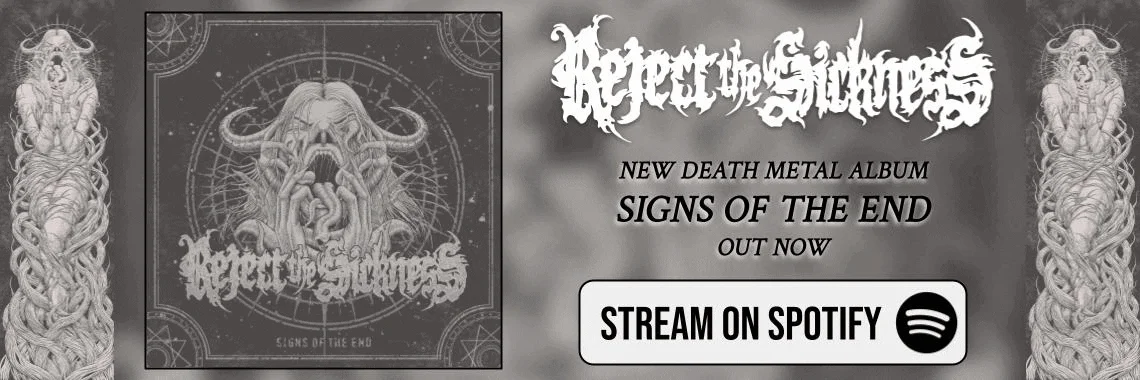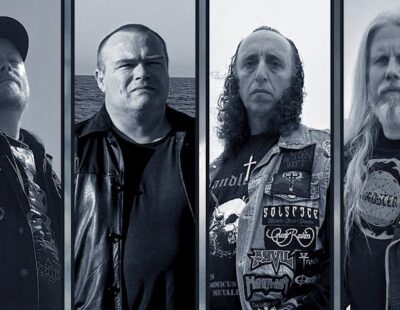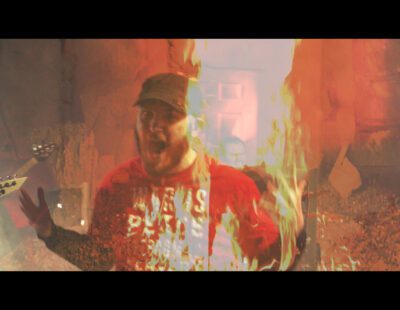
Jizzy Pearl has done it all in his four-plus decades in heavy music. Pearl (James Wilkinson) came of age in the 80s during the rise of hair and glam metal on the Sunset Strip. He hustled for the entire decade and dealt with perpetual poverty. His band Love/Hate was set to break big with their 1990 CBS debut, Blackout in the Red Room, but grunge was pushing metal aside. Love/Hate disbanded by the late ’90s, although they managed to get some media attention when Pearl staged a mock crucifixion on the Hollywood sign.
Pearl was just getting started. Starting in 1999, he became the replacement frontman for not one but three hair metal bands: L.A. Guns, Ratt and Quiet Riot (Pearl still tours with Quiet Riot). He also fronted Adler’s Appetite, the band founded by Guns N’ Roses drummer Stephen Adler. Love/Hate reformed early in the 21st century and is still active. Their new album Punk Rock Fiesta! was released this month. Pearl talked to us about his memorable career, what it’s like to front three bands, and why he keeps writing new music.
If a vocalist is lucky, they might have a chance to join a big band one time. You’ve done it three times and have your own band.
I won the triple crown (laughs). Now I’m the go-to guy when they need someone to learn a bunch of songs, get on a plane, and not fuck shit up. Back in the day, I didn’t have a full picture of what doing this involved. But now I know what it means and who I am. I don’t think about how long I’ve been doing this. I am a long-distance runner – both physically and musically. I look at Mick Jagger, and he’s 80 and sounds great. Mickey Thomas of Starship still sings those songs. I look to those guys as inspirations and tell myself it can be done. You need to keep the fire burning in your soul. Over here is Netflix and weed, and a lot of guys slow down and take it easy. Pretty soon, the legs that you used to run with get stiff.
Take me back to where you were when the Sunset Strip scene was starting up. How did you get involved?
When it first started, I was going to the Troubadour and Starwood. I couldn’t get into the Troubadour because I was underage, but I tried to get into the Starwood. I was just blown away by the way people dressed and acted. I grew up in the San Fernando Valley and it’s a fairly meat-and-potatoes middle-class conservative area – or at least it was at the time. Everyone in Hollywood was different, and it intrigued me. I was trying to be a musician, so it seemed like a natural place to go. That’s how it started.
What were some of the bands that grabbed you?
I used to see Quiet Riot when it was called DuBrow. There was a band called White Sister and another called Steeler with Ron Keel and Yngwie Malmsteen. I saw W.A.S.P. at the Troubadour when they threw raw meat at the audience. It was a special time.
Were you singing at that point? How did you discover your voice?
I was a singer, but the bands I played in were amateur. We wrote songs and played in the valley, and it never amounted to anything. Only when I joined Love/Hate did I fully commit to being a musician. That was a big step for me.
Did you learn to sing, or were you self-taught?
There was a famous vocal teacher named Elizabeth Sabine. I found her through the local music paper Music Connection. I took six lessons because it was all I could afford. It was 25 dollars for a half hour. I went to her house in the valley, and she answered, and some blonde guy walked past me who had just taken a lesson. She was shaking her head and was like, “that guy has just got no talent.” It turns out it was Vince Neil. My training was a few very positive lessons – we covered things like not losing your voice, which helped me years later when I was a touring musician. It was a good foundation.
So how, with so few formal lessons, did you refine your voice?
I listened to Led Zeppelin, the Who, and Dio. That was my school. I mimicked and emulated those three singers.
What was your life like during those years, and how did you go from being someone in the valley to part of the scene?
The years before we got the record deal were sheer desperation and poverty. We lived in a loft in downtown L.A. The rent was cheap because it was on Skid Row. We had hobos and hookers, and drug dealers as neighbors. They were our community. It was a very dark place, but the beauty of it through the barred prison windows was that you were free to make music and could be as loud as you wanted. A lot of guys had to rent rehearsal spaces and worked day jobs. We lived poor, like gypsies, but we had freedom.
As hard as it was, it seems like you had the liberty to build your band through repetition and practice. It’s very hard to do that now, but in the ’80s, you had the freedom to coalesce and become a band.
Living together was the best way to do it. When you live together, you become a tribe. As a tribe, you fight against other tribes, which were all the killer rock bands at the time. Even when you’re fighting, and it’s not wonderful, you’re still forced to work with the same guys. That builds strength, and it’s reflected in the music. Our first record smacks of authenticity for that reason.
You were still grinding it out when bands like Mötley Crüe and Ratt became household names. Did that make it more difficult or force you to work even harder?
It gives you hope. Seeing a band like Ratt come from nothing and go to heavy MTV rotation gives you hope. When Guns N’ Roses started, we opened for them. We opened for Jane’s Addiction, and I always marveled at how good they were. When you open for bands, you never think they will be headlining areas. You think they are a better version of you at the time. I was always hopeful. Everyone around you says you will never make it and are wasting your life and are an idiot – or worse. But if you have that stubborn drive to keep going against all odds, it can happen, and it did happen.
Blackout in the Red Room came out shortly before Nirvana broke big and changed music entirely.
Obviously, there was still no internet. You’d hear people saying, “Have you heard Nirvana?” It was like the Mongol army was coming to kill you, and you could see the fires in the hills (laughs). No one knew that it would be the demise of the Sunset Strip. We didn’t break as huge as Warrant because we were like equal parts Guns N’ Roses and Jane’s Addiction. We weren’t a pure hair metal band. When you are different, it takes a while to catch on. The Big Lebowski bombed but became this huge cult over the years.
There is a clip of you doing a street performance of “She’s an Angel” from Headbanger’s Ball in Europe. Even now, it’s incredibly powerful. I don’t know many performers who could sound that dialed in without a band behind them.
For all the talk of us not breaking in the US, we were totally embraced in the UK. We were on the covers of magazines and selling out 2,000-seat arenas. MTV called and said they wanted to do this impromptu busking thing. We did the same thing on Rikki Rachtman’s show. I feel like we were one of the first artists to do what was later known as unplugged.
It speaks to a performer’s strength — the ability to perform with minimal support.
It was also before any backing tracks. I do have a good memory of that performance. I learned from the best singers; any of those guys could do the same thing. So, that was what I tried to do.
What were the ’90s like as a performer and business wise?
Rags to riches to rags to riches. Love/Hate ended in the mid-’90s because the guys in the band got married and had kids. When that happens, the gypsy lifestyle doesn’t make sense. You have to make a living and grow up. I didn’t want to grow up. They moved out, but I lived in that crummy building in Los Angeles for years. It was like Howard Hughes in the dark with four-inch fingernails. It was bleak because my kind of music was uncool. It didn’t matter how good you were. If the music isn’t cool, you can’t work. I had to wait for Green Day and ska to run its course. In the latter part of the 90s, rock returned to a certain extent, and I joined L.A. Guns.
When did that phone call come?
I knew all the guys. They’d split up for a while. I got a call out of the blue, and they had a tour. Two weeks later, I found myself on a bus and was the singer of L.A. Guns.
So many Sunset Strip bands are now cautionary tales for drug abuse. Did you have any issues with substances?
I couldn’t afford to be a drug addict. I stopped doing most of that stuff before I ever had a record deal. I never had a problem with that. My problem was dealing with the daily melancholia of needing to keep going when everything around you says, “You had your day in the sun, and it’s time to become an accountant or a carpenter.” I wanted to keep being a musician.
So, how do you work through those challenging times?
I was just stubborn and had a narrow focus. I hustled gigs and new music and kept going. It was bleak, but it was cool. If you live like a gypsy you don’t think about stuff like that. Gypsies don’t worry about mortgages or bills. They think about playing the violin and dancing and watching the sunrise. I just carried on.
As someone who has written your own material, how do you learn another frontman’s work and honor it while adding your stamp?
You do the best you can. Never mimic the singer you are replacing because it will sound funny. Just do the best you can. Lead singers from that era sort of have the same timbre of voice. Axl, in his prime, has that rasp. Kevin DuBrow has that rasp. Stephen Pearcy has that rasp. If you have character in your voice and a good ear, you can find a way to make it work.
How did you go from L.A. Guns to Ratt? I remember when you joined Ratt, and it seemed like a big deal because Stephen is so associated with that band’s look and character.
I was very happy to get the gig. I was a huge fan of the band and music. Warren (DeMartini, guitarist) and I became friends. We had a lot in common. There was some resistance and antagonism, especially initially. After a while, people got used to it, and it became ok to be the replacement.
What do you mean by resistance?
People threw bottles at my head, and there were a lot of catcalls and “fuck yous.” I never took it personally. I never thought it was my original gig. I just tried to do the best I could in this chosen role. That’s all you can do. I get why it happened. If I went to see Queen, I wanted to see them with Freddy Mercury.
You joined Ratt more than 25 years ago. Bands nowadays come back with a new frontman playing classic albums all the time. You really only need one original.
Times have changed. Backing tracks used to be a career killer and now people don’t care.
One of the first bands you mentioned was Quiet Riot. Your voice and character seem to fit with the band, maybe better than the other bands.
I haven’t thought about that too much, but maybe you are right. You are looking at it objectively. Embodying the material is an interesting way of describing it. Like I said when I was in L.A. Guns or Ratt, I was serious about it. That’s all you can do as a performer. You’re only as good as your last gig.
Punk rock has always been part of the Sunset Strip spirit. I like that you honored that in the title and execution of the new album Punk Rock Fiesta! Were you a punk fan?
I was. I watched The Decline of Western Civilization a bunch of times. I got the attitude, and I dug that they didn’t care. When you saw Dead Boys or Black Flag, they had no fear. They didn’t care what people thought. There was a real strength there. It wasn’t about pentatonic scales or octave ranges. It was about delivery, authenticity, and ass-kicking.
Did you want to instill some of that spirit in this album?
Yes, it’s more aggressive. I’m not ready to go down the Billy Joel path. I want to stay youthful musically. There’s nothing I can do about my Wikipedia page. I want my fingers burned from carrying the torch. That’s why this record comes off the way it does – I am trying to stay heavy. This record came together very fast. I was mixing it four weeks ago.
Your career reminds me of that rare longtime pro athlete. Some football players win a Super Bowl and then fade out. You are one of the veterans still making an NFL team’s lineup.
You are correct in your assessment. You’ve never seen an episode of Behind the Music with me. People make records for themselves. You want people to love what you have done, but you make it for yourself. You want to keep the spirit alive. You don’t want to be sweating to the oldies. If you want to be that guy, that’s cool. But I have to periodically rise from the ashes with some new music to get through the next few years.







